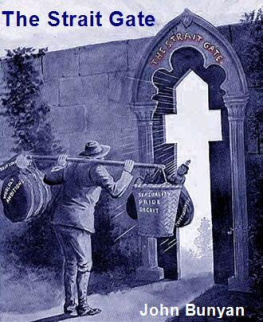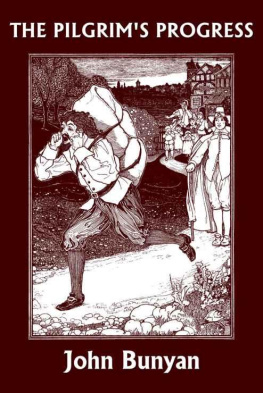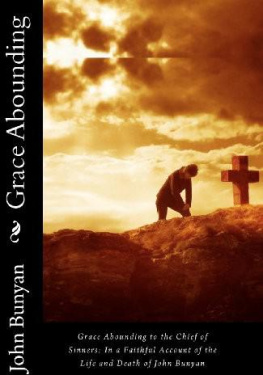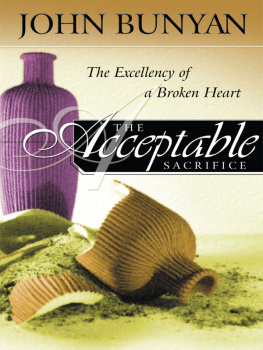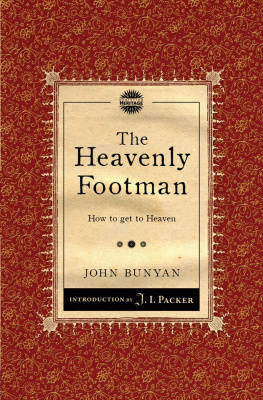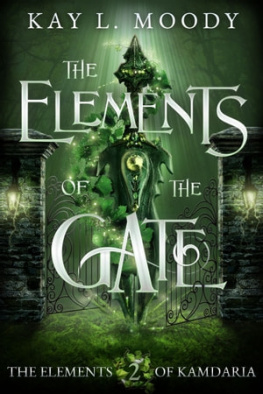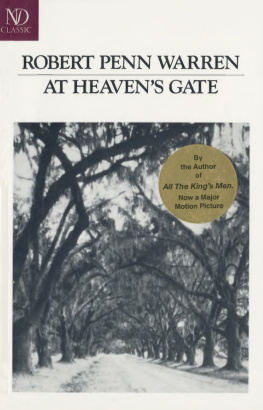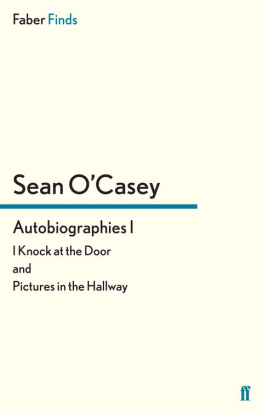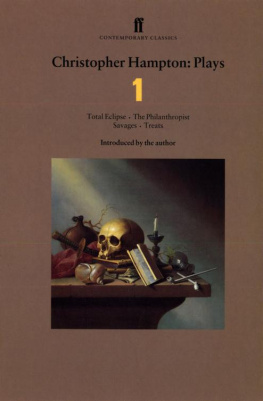John Bunyan - The barren fig-tree ; The strait gate ; The heavenly foot-man
Here you can read online John Bunyan - The barren fig-tree ; The strait gate ; The heavenly foot-man full text of the book (entire story) in english for free. Download pdf and epub, get meaning, cover and reviews about this ebook. publisher: ReadHowYouWant.com, genre: Science. Description of the work, (preface) as well as reviews are available. Best literature library LitArk.com created for fans of good reading and offers a wide selection of genres:
Romance novel
Science fiction
Adventure
Detective
Science
History
Home and family
Prose
Art
Politics
Computer
Non-fiction
Religion
Business
Children
Humor
Choose a favorite category and find really read worthwhile books. Enjoy immersion in the world of imagination, feel the emotions of the characters or learn something new for yourself, make an fascinating discovery.
- Book:The barren fig-tree ; The strait gate ; The heavenly foot-man
- Author:
- Publisher:ReadHowYouWant.com
- Genre:
- Rating:3 / 5
- Favourites:Add to favourites
- Your mark:
- 60
- 1
- 2
- 3
- 4
- 5
The barren fig-tree ; The strait gate ; The heavenly foot-man: summary, description and annotation
We offer to read an annotation, description, summary or preface (depends on what the author of the book "The barren fig-tree ; The strait gate ; The heavenly foot-man" wrote himself). If you haven't found the necessary information about the book — write in the comments, we will try to find it.
The barren fig-tree ; The strait gate ; The heavenly foot-man — read online for free the complete book (whole text) full work
Below is the text of the book, divided by pages. System saving the place of the last page read, allows you to conveniently read the book "The barren fig-tree ; The strait gate ; The heavenly foot-man" online for free, without having to search again every time where you left off. Put a bookmark, and you can go to the page where you finished reading at any time.
Font size:
Interval:
Bookmark:
THE STRAIT GATE
OR,
GREAT DIFFICULTY OF GOING TO HEAVEN:
By: John Bunyan
Plainly proving, by the Scripture, that not only the Rude and Profane, but many great Professors, will come short of that Kingdom.
"Enter ye in at the strait gate; for wide is the gate, and broad is the way, that leadeth to destruction, and many there be which go in thereat: because strait is the gate, and narrow is the way, which leadeth unto life, and few there be that find it." Matthew 7:13, 14.
TO THE READER
COURTEOUS READER,
God (I hope) hath put it into my heart to write unto thee another time, and that about matters of the greatest moment (for now we discourse not about things controverted among the godly, but directly about the saving or damning of the soul; yea, moreover, this discourse is about the fewness of them that shall be saved, and it proves that many an high professor will come short of eternal life); wherefore the matter must needs be sharp, and so disliked by some, but let it not be rejected by thee. The text calls for sharpness, so do the times, yea, the faithful discharge of my duty towards thee hath put me upon it.
I do not now pipe, but mourn; and it will be well for thee if thou canst graciously lament, Matthew 11:17. Some (say they) make the gate of heaven too wide, and some make it too narrow; for my part, I have here presented thee with as true a measure of it, as by the word of God I can. Read me, therefore, yea, read me, and compare me with the Bible; and if thou findest my doctrine and that book of God concur, embrace it, as thou wilt answer the contrary in the day of judgment. This awakening work (if God will make it so) was prepared for thee: if there be need, and it wounds, get healing by blood: if it disquiets, get peace by blood: if it takes away all thou hast, because it was naught (for this book is not prepared to take away true grace from any), then buy of Christ gold tried in the fire, that thou mayst be rich, and white raiment, that thou mayst be clothed, and that the shame of thy nakedness doth not appear, and anoint thine eyes with eye-salve, that thou mayst see, Revelation 3:18. Self-flatteries, self-deceivings, are easy and pleasant, but damnable. The Lord give thee an heart to judge right of thyself, right of this book, and so prepare for eternity, that thou mayst not only expect entrance, but be received into the kingdom of Christ and of God. Amen.
So prays thy Friend,
John Bunyan.
THE STRAIT GATE
OR
GREAT DIFFICULTY OF GOING TO HEAVEN.
"Strive to enter in at the strait gate; for many, I say unto you, will seek to enter in, and shall not be able." Luke 13:24.
These are the words of our Lord Jesus Christ, and are, therefore, in especial manner to be heeded; besides, the subject matter of the words is the most weighty, to wit, how we should attain salvation, and therefore also to be heeded.
The occasion of the words was a question which one that was at this time in the company of the disciples, put to Jesus Christ; the question was this, "Lord, are there few that be saved?" Luke 13:23. A serious question, not such as tended to the subversion of the hearers, as too many now a-days do; but such as in its own nature tended to the awakening of the company to good, and that called for such an answer that might profit the people also. This question also well pleased Jesus Christ, and he prepareth and giveth such an answer as was without the least retort, or shew of distaste; such an answer, I say, as carried in it the most full resolve to the question itself, and help to the persons questioning: "And he said unto them, Strive to enter in," etc. The words are an answer, and an instruction also.
1. An answer, and that in the affirmative; the gate is strait, many that seek will not be able, therefore but few shall be saved.
2. The answer is an instruction also; "strive to enter in," etc. good counsel and instruction; pray God help me, and my reader, and all that love their own salvation, to take it.
My manner of handling the word will be, first, by way of explication, and then by way of observation.
I. BY WAY OF EXPLICATION
The words are to be considered, first, with reference to their general scope; and then with reference to their several phrases.
First, the general scope of the text is to be considered, and that is that great thing salvation; for these words do immediately look at, point to, and give directions about salvation: "Are there few that be saved? strive to enter in at the strait gate."
The words, I say, are to direct us, not only to talk of, or to wish for, but to understand how we shall, and to seek that we may be effectually saved, and therefore of the greatest importance. To be saved! what is like being saved?
To be saved from sin, from hell, from the wrath of God, from eternal damnation, what is like it? To be made an heir of God, of his grace, of his kingdom and eternal glory, what is like it? and yet all this is included in this word saved, and in the answer to that question, are there few that be saved?
Indeed this word saved is but of little use in the world, save to them that are heartily afraid of damning. This word lies in the Bible, as excellent salves lie in some men's houses, thrust into a hole, and not thought on for many months, because the household-people have no wounds or sores. In time of sickness, what so set by as the doctor's glasses and gal ey-pots full of his excellent things? but when the person is grown well, the rest is thrown to the dunghill. Oh! when men are sick of sin, and afraid of damning, what a text is that, where this word saved is found? Yea, what a word of worth, and goodness, and blessedness, it is to him that lies continually upon the wrath of a guilty conscience? "But the whole need not the physician;" he therefore, and he only, knows what saved means, that knows what hell, and death, and damnation means. "What shall I do to be saved?" is the language of the trembling sinner. "Lord save me," is the language of the sinking sinner; and none admire the glory that is in the word saved, but such as see, without being saved, all things in heaven and earth are emptiness to them. They also that believe themselves privileged in all the blessedness that is wrapped up in that word, bless and admire God that hath saved them. Wherefore, since the thing intended, both in the question and the answer, is no less than the salvation of the soul, I beseech you to give the more earnest heed, Hebrews 21.
But to come to the particular phrases in the words, and to handle them orderly, in the words I find four things.
(1.) An intimation of the kingdom of heaven;
(2.) A description of the entrance into it;
(3.) An exhortation to enter into it; and,
(4.) A motive to enforce that exhortation.
1. An intimation of the kingdom of heaven; for when he saith, "Strive to enter in;" and in such phrases there is supposed a place or state, or both, to be enjoyed. "Enter in;" enter into what, or whither, but into a state or place, or both? and therefore when you read this word, "enter in," you must say there is certainly included in the text that good thing that yet is not expressed. "Enter in;" into heaven, that is the meaning, where the saved are, and shall be; into heaven, that place, that glorious place, where God, and Christ, and angels are, and the souls or spirits of just men made perfect. "Enter in;" that thing included, though not expressed in the words, is called in another place, the Mount Zion, the heavenly Jerusalem, the general assembly and church of the first-born which are written in heaven, Hebrews 12. And therefore the words signify unto us, that there is a state most glorious, and that when this world is ended; and that this place and state is likewise to be enjoyed, and inherited by a generation of men for ever. Besides, this word, enter in, signifieth that salvation to the full is to be enjoyed only there, and that there only is external safety; all other places and conditions are hazardous, dangerous, full of snares, imperfections, temptations, and afflictions, but there all is well; there is no devil to tempt, no desperately wicked heart to deliver us up, no deceitful lust to entangle, nor any enchanting world to bewitch us: there all shall be well to all eternity. Further, all the parts of, and circumstances that attend salvation, are only there to be enjoyed: there only is immortality and eternal life; there is the glory and fullness of joy, and the everlasting pleasures; there is God and Christ to be enjoyed by open vision, and more; there are the angels, and the saints; further, there is no death, nor sickness, nor sorrow, nor sighing, for ever: there is no pain, nor persecutor, nor darkness, to eclipse our glory. O this Mount Sion! O this heavenly Jerusalem! 2 Corinthians 5:1-5; Psalm 16:11; Luke 20:35, 36; Hebrews 12:12-14.
Next pageFont size:
Interval:
Bookmark:
Similar books «The barren fig-tree ; The strait gate ; The heavenly foot-man»
Look at similar books to The barren fig-tree ; The strait gate ; The heavenly foot-man. We have selected literature similar in name and meaning in the hope of providing readers with more options to find new, interesting, not yet read works.
Discussion, reviews of the book The barren fig-tree ; The strait gate ; The heavenly foot-man and just readers' own opinions. Leave your comments, write what you think about the work, its meaning or the main characters. Specify what exactly you liked and what you didn't like, and why you think so.

